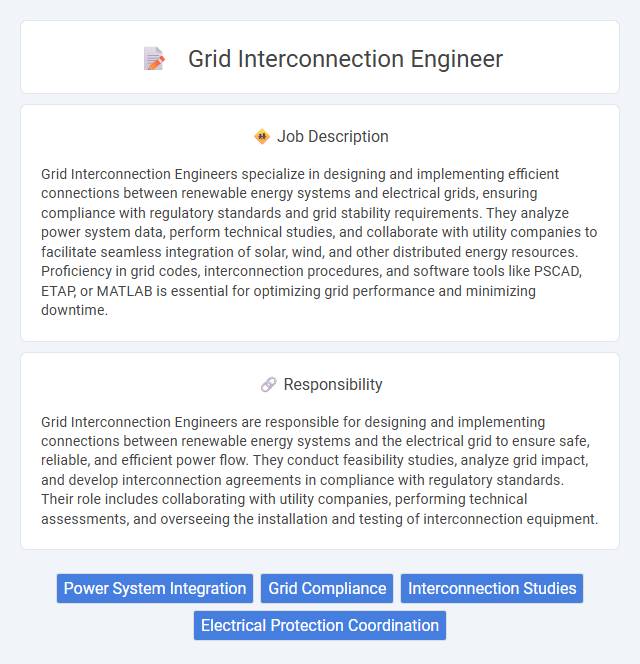
Grid Interconnection Engineers specialize in designing and implementing efficient connections between renewable energy systems and electrical grids, ensuring compliance with regulatory standards and grid stability requirements. They analyze power system data, perform technical studies, and collaborate with utility companies to facilitate seamless integration of solar, wind, and other distributed energy resources. Proficiency in grid codes, interconnection procedures, and software tools like PSCAD, ETAP, or MATLAB is essential for optimizing grid performance and minimizing downtime.
Individuals with strong analytical skills and a passion for renewable energy are likely to thrive as Grid Interconnection Engineers. Those comfortable working with complex electrical systems and regulatory standards may find this role highly suitable. People who prefer collaborative problem-solving and adapting to evolving technologies have a higher probability of excelling in this position.
Qualification
A Grid Interconnection Engineer must hold a degree in Electrical Engineering or a closely related field, with strong expertise in power systems design, protection schemes, and grid codes compliance. Proficiency in software tools such as PSCAD, ETAP, or MATLAB is essential for modeling and analyzing grid connections and fault conditions. Experience in coordinating with utilities, regulatory agencies, and project teams to ensure seamless integration of renewable energy systems into the grid is highly valued.
Responsibility
Grid Interconnection Engineers are responsible for designing and implementing connections between renewable energy systems and the electrical grid to ensure safe, reliable, and efficient power flow. They conduct feasibility studies, analyze grid impact, and develop interconnection agreements in compliance with regulatory standards. Their role includes collaborating with utility companies, performing technical assessments, and overseeing the installation and testing of interconnection equipment.
Benefit
Grid Interconnection Engineer roles likely offer significant benefits such as competitive salaries and opportunities to work on cutting-edge renewable energy projects. Employees probably gain valuable experience in power grid optimization and regulatory compliance, enhancing their technical expertise. The position may also provide strong job stability due to increasing demand for clean energy integration.
Challenge
Grid Interconnection Engineers likely face challenges related to integrating renewable energy sources into existing power grids while ensuring stability and reliability. They probably encounter complex regulatory requirements and technical constraints that demand innovative problem-solving skills. Balancing the increasing demand for clean energy with grid capacity limitations may also present ongoing difficulties in their role.
Career Advancement
Grid Interconnection Engineers specialize in integrating renewable energy sources with power grids, ensuring system reliability and compliance with regulatory standards. Mastery of grid codes, advanced simulation tools, and project management accelerates career progression toward senior engineering or technical leadership roles. Industry experience coupled with certifications in energy systems enhances opportunities for impactful positions in utility companies or renewable energy firms.
Key Terms
Power System Integration
Grid Interconnection Engineers specialize in the seamless integration of renewable energy sources and distributed generation into existing power systems, ensuring stability, reliability, and compliance with regulatory standards. They conduct detailed system impact studies, design protective relaying schemes, and coordinate with utilities to optimize grid connectivity. Proficiency in power system analysis software and knowledge of interconnection codes such as IEEE 1547 and FERC standards are essential for successful project implementation.
Grid Compliance
Grid Interconnection Engineers specialize in ensuring that power generation systems meet all regulatory and technical standards for grid compliance. They conduct detailed assessments of electrical equipment and infrastructure to verify adherence to interconnection codes and utility requirements. Their role includes coordinating with utilities and regulatory agencies to facilitate smooth integration of renewable and traditional energy sources into the power grid.
Interconnection Studies
Grid Interconnection Engineers specialize in conducting Interconnection Studies to evaluate the feasibility and impact of connecting new power generation resources to the existing electrical grid. These studies analyze system stability, fault currents, voltage regulation, and protection coordination to ensure reliable integration without disrupting grid operations. Proficiency in power system modeling software and compliance with regional interconnection standards are essential for optimizing grid performance and facilitating renewable energy integration.
Electrical Protection Coordination
Grid Interconnection Engineers specializing in Electrical Protection Coordination design and implement protection schemes to ensure seamless integration of distributed energy resources with the power grid. Their expertise involves analyzing fault currents, setting relay parameters, and coordinating protective devices to prevent equipment damage and maintain grid stability. Proficiency in protection relays, SCADA systems, and compliance with IEEE and IEC standards is critical for optimizing grid reliability and safety.
 kuljobs.com
kuljobs.com